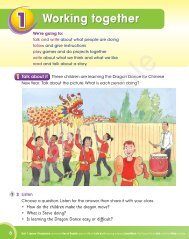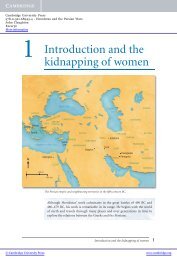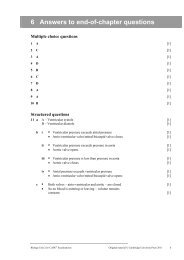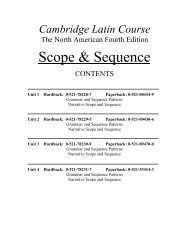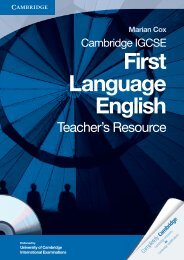Brad Philpot - Cambridge University Press
Brad Philpot - Cambridge University Press
Brad Philpot - Cambridge University Press
You also want an ePaper? Increase the reach of your titles
YUMPU automatically turns print PDFs into web optimized ePapers that Google loves.
Text 1<br />
(from PLA)<br />
Text 2<br />
(from PLT list)<br />
Title The Handmaid’s Tale One Day in the Life of<br />
Ivan Denisovich<br />
Author Margaret Atwood Alexander<br />
Solzhenitsyn<br />
Themes Women in society,<br />
religion, totalitarian<br />
states<br />
Genre Dystopian fi ction /<br />
speculative fi ction<br />
Defi ning<br />
characteristics<br />
of genre<br />
Context (political,<br />
social, cultural,<br />
religious)<br />
Stylistic and<br />
structural devices<br />
that refl ect context<br />
of composition<br />
Oppressed person,<br />
oppressive state,<br />
happiness and<br />
society<br />
USA, religious right<br />
and feminism, Iran,<br />
Cold War<br />
1st person, stream<br />
of consciousness,<br />
present tense<br />
Totalitarian state<br />
(Stalinism), dignity,<br />
individualism versus<br />
socialism<br />
Text 3<br />
(free choice)<br />
Vernon God Little<br />
D.B.C. Pierre<br />
Individual versus<br />
society, dignity,<br />
media and violence<br />
Historical / memoir Dystopian fi ction /<br />
Bildungsroman<br />
Infl uential period<br />
from someone’s life,<br />
wisdom with benefi t of<br />
hindsight<br />
Stalinism, personal<br />
experience in Siberian<br />
labour camp<br />
3rd person, free<br />
indirect speech,<br />
detailed description of<br />
physical labour<br />
Coming of age, lifeshaping<br />
decisions,<br />
journeys<br />
Columbine<br />
shootings, reality<br />
TV<br />
1st person, stream<br />
of consciousness,<br />
present tense<br />
Activity 6.3<br />
Find out more about the contexts of the texts that you are reading for Part 3. Use the<br />
following questions to help you.<br />
1 What inspired the author of the text you are reading?<br />
2 Learn more about the characteristics that define the genre to which your text<br />
belongs. Why do you think the author chose that particular genre to express<br />
their ideas?<br />
3 Comment on how any stylistic and structural devices reflect the context<br />
of composition.<br />
4 As a class, fill in a table similar to the one above to act as a record of the texts<br />
you are reading.<br />
Unit 6.2 Literary movements<br />
Chapter 6 The context of composition<br />
Sample<br />
Many literary works are closely associated with a particular historical or artistic<br />
movement. Movements often transcend the boundaries of one art form, and<br />
characterstics of a movement can sometimes continue beyond the time period usually<br />
given as the beginning and end of the movement. Romanticism, for example, was<br />
a movement that took hold in Europe in the second half of the 18th century, rooted<br />
in the idea that emotions and nature were true sources of knowledge. It gave rise to<br />
an explosion of visual arts, philosophical essays, music and literature. The effects and<br />
influence of Romanticism continue to this day. Even after the movement had been<br />
succeeded by the Victorian period, realism and the Industrial Revolution, there were<br />
© <strong>Cambridge</strong> <strong>University</strong> <strong>Press</strong> 2011<br />
TOK<br />
Romanticism was a philosophical<br />
and artistic movement that came<br />
about as a reaction to the neo-<br />
Classicism and Enlightenment of<br />
the 18th century and the beginnings<br />
of the Industrial Revolution. The<br />
main idea behind Romanticism was<br />
that emotions were a source of<br />
truth. Other sources of inspiration<br />
included nature, beauty and youth.<br />
1 Read Text 6.3, a poem by<br />
William Wordsworth, and<br />
comment on how it refl ects the<br />
ideas of Romanticism.<br />
2 Comment in particular on the<br />
notion that The child is father of<br />
the man. Can a child know more<br />
or be wiser than an adult? What<br />
do you think Wordsworth means<br />
when he says a child can be father<br />
of the man? Discuss the relevance<br />
of the TOK terms (a) intuition and<br />
(b) wisdom in your answer.<br />
143



